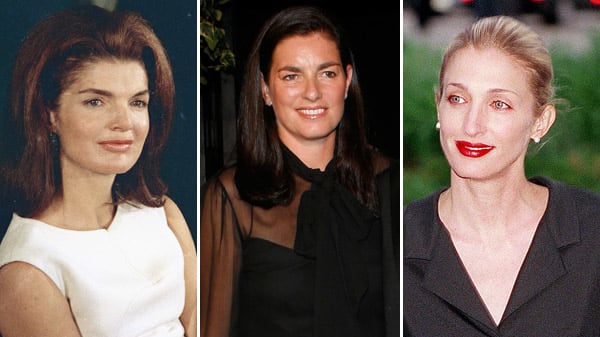In her autobiography, Times to Remember, Rose Kennedy—the legendary matriarch of the Kennedy clan who died in 1995 at 104 years old—recounts a subtly illuminating story. When her husband, Joe, was away on business trips and Rose was at home with their nine children, she made it a practice not to tell him about stressful or worrisome news. She didn’t want to distract him from his own important work. She writes:
“I remember once, for instance, when he was in California and telephoned me within a matter of minutes after I arrived home from a car accident that had put a good-sized gash in my forehead. I was feeling shaky. In fact when the call came I was lying on my bed pulling myself together and drinking coffee. But I spoke naturally, gave him the news of the children and told him what a fine day it was: a perfect day for golf. Then I drove to the hospital where the doctor took five stitches in my forehead.”
It’s exactly the sort of steely, quiet strength that many of us associate with the patrician Kennedy clan. But Rose was also setting a precedent for generations of women to come. It was no small act to follow. The Kennedys are still the closest thing America has to a royal family. And from the outside, the clan often looks postcard-perfect: they’re beautiful and blessed, sailing off the coast of Cape Cod, or playing touch football on the lawn in Hyannisport. We all know that there’s darkness too—alcoholism, sex scandals, untimely tragedies, assassinations. For those who marry into the legendary tribe, that darkness often appears after the nuptials, when the pressures grow extreme and the golden family name can become less like a crown and more like an anchor.
ADVERTISEMENT
For all the talk of a “Kennedy curse” after the death this week of yet another family member—Mary, the estranged wife of Rose’s grandson Robert F. Kennedy Jr.—the truly tragic story might be not just how difficult it is to be a Kennedy, but particularly a Kennedy wife.
“What I have found is that, no surprise, marrying into a family like the Kennedys does have huge pitfalls,” says J. Randy Taraborrelli, the author of Jackie, Ethel, Joan—Women of Camelot, and, most recently, After Camelot: A Personal History of the Kennedy Family-1968 to the Present. “There’s a lot of pressure in having personal problems but making sure people don’t know about them, a lot of guilt with feeling like you’re letting down this huge historical family. Nobody wants to believe they’ll be the next Kennedy curse statistic.”

Women like Mary and Carolyn Bessette-Kennedy—who died in a plane crash with her husband, John F. Kennedy Jr., off the coast of Martha’s Vineyard—weren’t accustomed to the kind of public scrutiny that their husbands had lived with since childhood. But, Taraborrelli says, the men did little to ease the adjustment. “Customarily the men haven’t been as understanding and sympathetic to the plight of the women and the family as they could have been,” he says. “'Buck up. Kennedys don’t cry. Get it together. Smile and be happy.’ That’s what they told Carolyn Bessette all the time.”
Kennedy women—from Rose to Jackie, and even Maria Shriver—have stoically endured not only tragedies, but personal humiliations. There, too, the bar is a high one. “Nobody wants to be the one who can’t do it, because women before have.”
The expectations for Kennedy women were narrow and clear. “When Robert F. Kennedy died, all of the boys in the family were given mentors, successful men who basically taught them that they could be president,” says Laurence Leamer, a historian and author of The Kennedy Women and the Kennedy Men. “They had this great obligation to fill. The women were told to go to church … The tradition was that the women went to church and were loyal and emotive and the men went out and did their thing.”
For wives—particularly political wives—the pressure was intense, and the job demanded self-sacrifice. “A woman’s virtue is not to embarrass the men of the family, obstruct their careers, dim their accomplishments,” Pulitzer-Prize-winning historian Garry Wills wrote in The Kennedy Imprisonment: A Meditation on Power. “In fact, she must not only excuse her husband’s lack of attention to her, but make her forgiveness so manifest that no one else will have trouble forgiving him.” Of Jackie Kennedy, who famously turned a blind eye toward her husband’s many infidelities, he writes, “Like Rose Kennedy, but for very different reasons, she would not criticize her husband’s affairs with other women. It was part of the world she knew, where fame and money and glamour cost something.”
How to properly play the role of an ex-wife wasn’t so clearly spelled out. In her 1997 book, Shattered Faith, Sheila Rauch Kennedy wrote that her former husband, Joe Kennedy (Bobby’s brother) had secretly requested and been granted an annulment, effectively de-sanctifying their 12-year marriage, which had produced two children. She wrote that during the marriage, her husband used to tell her she was a “nobody” and he was the star. In interviews at the time of the book’s release, she spoke of a “conspiracy of silence,” and said the family used to tell her, “Kennedy wives don’t talk.” She told The New York Times that the couple's friends had stuck with Joe, “the better deal,” and that she felt isolated, shunned by the rest of the family.
It’s not hard to imagine that Mary must have been felt similarly abandoned after her recent separation from Robert. “She was not known in the family as being a particularly fragile person,” says Taraborrelli. “It’s been the toughest Kennedys that have the biggest problems because they’re not as open to assistance.” Taraborelli adds that Mary “had a lot of shame” because of her DUI arrests several years ago, and that she was “very, very close” to her mother-in-law Ethel Kennedy, who had largely taken over the role of family matriarch after Rose Kennedy’s death. Like Rose, Ethel is reported to be strong-willed and very religious. “She’s the one you don’t want to let down,” Taraborrelli says.
“How lonely and isolating it must have been,” Leamer says of Mary’s state shortly before her suicide. “In any divorce, people choose sides. In this case, it was clear they were going to choose his side. He had the power.”





